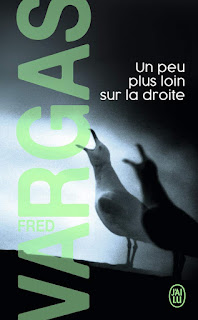Un peu plus loin sur la droite - Fred Vargas
But what he is currently more interested in more than any usual report in the papers is dog shit. Or to be precise, something he finds in what has been deposited by bench 102 by a passing dog. He takes his findings to the police and demands to see the Commissioner, claiming that what he has is a small bone from a human foot and asking to examine lists of missing persons. He knows fine well that he will not be taken seriously, and seems to going out of his way to deliberately antagonise and discredit the current chief Paquelin. He's far from crazy, even if he truly believes that the bone has arrived there, deposited by a dog, left on the grille of a tree when the 'merde' was washed away.
As crazy as it seems, the investigation takes him to the north west of France to the coastal town of Port- Nicolas near Quimper. looking for owner of the dog he believes ate the bone of a woman found dead on the shore. Despite it not having been officially reported, through his own contacts and investigation he discovers that the woman is indeed missing a bone from one toe.
Vargas is on terrific form here, her wicked sense of humour in absurdity in evidence early on when Louis takes his finding to the new police commissioner in the district who he doesn't like - Paquelin apparently Adamsberg's replacement. Even more so when we move outside Paris to a small provincial town filled with colourful characters - and even one of Kehlweiler's old flames - each of whom spar in hugely entertaining exchanges with the eccentric Allemand with his pet toad Bufo. There is something of a classic Sherlock Holmes character about him, his mysterious background in Ministry of Interior, now controlling his own private 'grande armée' observing for anything untoward.
A little more conventionally, Vargas succumbs to a few pages where the killer espouses his theories in italics, but these are brief and left to resonate and resonation is what Vargas does well. Although Commissaire Adamsberg has already been created and even referenced here - if not yet developed beyond one novel L'homme aux cercles bleus - Kehlweiler has many of the same characteristics. He's intuitive, bears a mantle of melancholy over failed romances, puts a lot of effort into trying to resolve small details that niggle and won't let go. Even the creation of a "fabuleuse machine à rien" created by Sevran plays a part in contributing to the tone of general strangeness, eccentricity and hard to define tensions in the whole situation.
While it might seem to be dealing with absurdity, Vargas never loses sight of the more sinister undercurrents. Or perhaps not sinister, but within the personal and romantic inclinations of both Kehlweiler and Marc Vandoosler (the other two evangelists playing lesser roles here) there is a hint of regret or dissatisfaction, something troubling both that creates a melancholy undertow to the surface humour and absurdity. Combined with the nature of the investigation in a northern French seaside town in November, the tone is superbly balanced and maintained, and used for a legitimate purpose.
The justification for the absurdity and darker undercurrents is pulled off brilliantly by Vargas at the surprising conclusion. If you thought the plot was just an idea excuse to play around with a group of eccentric characters, well, you are partly right, but Kehlweiler has deeper motivations for his behaviour, for his logging of newspaper reports and dogged (ha!) pursuance of little clues and crimes. There is a reason too why he feels a deep sense of betrayal in his relationships with the women in his life. His perseverance is rewarded, find a way to resolve a significant historical crime through a piece of dog shit. Only Fred Vargas could make something like this work.
Reading notes: I'm currently re-reading all Fred Vargas in French, which is worthwhile for a number of reasons, not least the fact that I think she is the best crime writer in France, but also it's been too long since I last read them and other than a few memorable images, I no longer remember the details of how they each play out. Another good reason to keep reviews.
I previously read this in a collected slipcased paperback French edition of the Three Evangelists books, but I no longer have that collection. This re-reading was from an eBook collected edition 'Pack collector Fred Vargas - Les Enquêtes des Evangélistes', which collects Debout les morts, Un peu plus loin sur la droite and Sans feu ni lieu.




Comments
Post a Comment